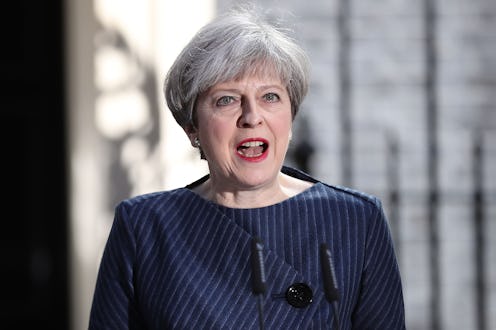News
What Is A Snap Election? Theresa May Just Called For One

The ongoing saga of Brexit took another unexpected turn Tuesday morning, when British Prime Minister Theresa May called for snap general elections on June 8, nearly three years before it was scheduled to happen. Many Americans may not know what a snap election is, since the United States holds presidential elections every four years, regardless of whether the president or any other elected official wants them or not.
Essentially, a snap election is when an election is held much earlier than the normal interval between elections, and it can be a powerful strategic tool for politicians. In theory, the United Kingdom holds federal-level elections every five years. However, prime ministers, in conjunction with Parliament, have the power to schedule elections sooner than then (whereas the U.S. Constitution mandates presidential elections every four years). When the prime minister decides to not use the full five years and shorten the time between elections, it's called a snap election.
This means that all 650 seats in the House of Commons are up for grabs, which is even more meaningful in the UK than it would be in the U.S. In the House of Representatives, incumbents are typically reelected at rates of 85 percent or higher. The incumbent advantage in the UK is generally weaker than the U.S., so the partisan split of Parliament could be much different after this election. However, there's still a chance that the election might not happen at all, or it could backfire on May and the Conservatives.
Ultimately, there are two ways this move could fail for May. Either the proposal for the election gets blocked in the House of Commons, or opposition parties could steal seats from her Conservative Party if the election happens. In the press conference announcing the snap election, May said that she wanted to hold the election to decrease the political division in Parliament, ostensibly by gaining more MP seats for the Conservative Party.
"Division in Westminster will risk our ability to make a success of Brexit and it will cause damaging uncertainty and instability to the country," May said Tuesday. Yet that very division could prevent the election from happening. Two-thirds of the MPs in the House of Commons need to vote in favor of holding the election, and the Conservatives have just over half of the seats in Parliament.
The primary opposition Labour Party could block the two-thirds majority easily, so that seems to be their move, unless they think they have a strong chance at gaining seats in the election. Recent polls indicate that the Conservative Party has a strong advantage over the Labour Party, and since it seems that an election would put them at an even more severe political disadvantage, it's unclear what Labour's political motivation would be to approve the measure. Still, Labour may vote to hold the election in the hopes of gaining back ground in Parliament.
Snap elections in Britain aren't too different than regularly scheduled elections, at least in terms of the electoral mechanisms used. But this election could create a very different government, and it may not be in May's favor.